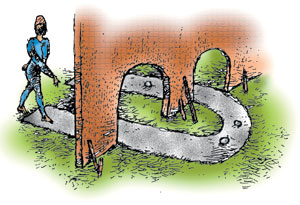 Most Nepali intellectuals aren't seekers of truth. And quite unlike intelligentsia elsewhere, our buddhijibis embrace fashionable fads of the day.
Most Nepali intellectuals aren't seekers of truth. And quite unlike intelligentsia elsewhere, our buddhijibis embrace fashionable fads of the day. Berating the government and eulogising the free market are parts of the LPG (liberalisation, privatisation and globalisation) agenda of the Global Right. Nepali buddhijibis found little to worship in the undeveloped markets of Nepal in the 1990s. Nevertheless, they took to ridiculing the government. We saw a torrent of vitriol lashing Singha Darbar soon after the installation of the first popularly elected government after more than three decades.
To be sure, the democratic governments under Girija Prasad Koirala, Manmohan Adhikari, and then the revolving-door coalitions of hung parliaments after the mid-term polls of 1994, offered little to cheer about. Much of the criticism-rampant corruption, naked nepotism, and blatant favouritism-were quite justified. But the scandals helped check a repetition of such undemocratic practices by later governments-duty-free privileges for MPs have now become history. But nothing can justify the hurry with which our exalted buddhijibis became Maoist apologists when the "People's War" began in February, 1996.
It was an unjust war to begin with, and it got increasingly destructive as it spread. Five years later, terrorism has played havoc with the economy, disrupted the strengthening of local government, and it has stretched fragile ethnic relations to breaking point. Had the intelligentsia contemplated these possibilities in advance (parallels from Cambodia and Sri Lanka were not difficult to draw) and cautioned society to the dangers of ultras using armed struggle, perhaps things would have been a lot different.
But safe in their perches in Kathmandu, buddhijibis took sadistic pleasure in lynching the government on the one hand and glamorising guerrillas on the other. They didn't even pause to consider their stand until the Maoists started to knock on their doors with extortion threats in August and September this year. But chance seems to have played its role in exposing the hypocrisy of the Nepali chatterati. The fad now is fighting terrorism "in whatever form, in whichever place for whatsoever reason" along with the leaders of global capitalism. Maoist insurgents have suddenly become pariahs even for their ardent apologists in Nepali media and academia.
Speaking to a select audience at Baggikhana last Friday, Prof Richard Rorty of Stanford University emphasised the role happenstance plays in political development. Nepali history is replete with example of the ripple effect of events elsewhere in the world. The withdrawal of the British Empire from South Asia in the aftermath of World War II precipitated the fall of Rana Oligarchy in 1950, and the crumbling of the Berlin Wall coupled with undeclared economic blockade imposed by India helped build democracy in 1990.
The recent surge in anti-terrorist rhetoric too followed a similar historical imperative-the cataclysmic horror of 11 September. Black Tuesday suddenly transformed many Nepali intellectuals into anti-Maoist warriors. To curry favour with the Americans and score brownie points over Pakistan, India is trying to whip up frenzy against terrorism in the South Asian region. India's foreign minister Jaswant Singh found it strategically expedient to lump the LTTE and Maoists with the jihadis of Kashmir. Neat trick, considering that the first two owe a lot to Indian acquiescence, if not outright collaboration. But, hey, the CIA propped up the Taliban too.
Then reports started coming in that our southern border is now being watched by 10,000 of India's elite security forces. It is not as easy as it used to be for the Maoists to cross the border and run training camps in the hospitable terrain of a friendly neighbouring country. We therefore started talking about the degeneration in the Maoist insurgency. Actually, after agreeing to the release of abducted policemen, I have sympathy for the cornered Maoist leadership.
Maoist terror tactics have been refined over the last five years and less vicious in last three months. They don't hack their opponents to pieces as they often did. Instead of mass murders, Maoists are carrying out mass meetings. This is not degeneration. Despite the glamourisation of the war by fashionable lefties and the fecklessness of successive governments in Singha Darbar, the Maoist war is burning itself out. Hemmed in by Indian security forces from three sides, not tolerated anymore by the Royal Nepal Army, Maoists now have nowhere to go but to the negotiating table. It's up to the government to bring them gently into the mainstream.
But more than accommodating Pushpa Kamal Dahal and Dr. Babu Ram Bhattarai into ministerial berths through the back-door of an interim government, the challenge before Sher Bahadur Deuba is to rehabilitate Maoist guerrilla cadre. Absorbing them into the armed police force may be a likely solution-after all, former hunters make good conservationists. But it will require ideological detoxification of youths raised on hate.
Addressing Maoist grievances about oppressions of ethnic, gender and untouchability, and working to eradicate social ills like drunkenness and gambling won't need a violent revolution. Administrative sincerity, commitment to reform and social justice can produce the same result. And it will be more sustainable than transitory transformations the Maoists have been able to enforce out of fear. Political power may sometimes come from the barrel of a gun, but social transformation does not happen that way.
Perhaps there will be peace by Dasain, but the government must display its will to keep it. As K P Bhattarai pointed out in a manner so uncharacteristic of him, loose talk about an interim government or a new constitution can weaken democracy. Bhattarai admonished his favourite acolyte Sher Bahadur Deuba in no uncertain terms: if it ain't broke, don't fix it. Before the task of constitutional amendment can be taken up, the priority for government will lie in first making it prevail. Establish the legal process of constitutional amendment before tinkering with it. After the killing and suffering, the prospect of peace is itself worth celebrating.



